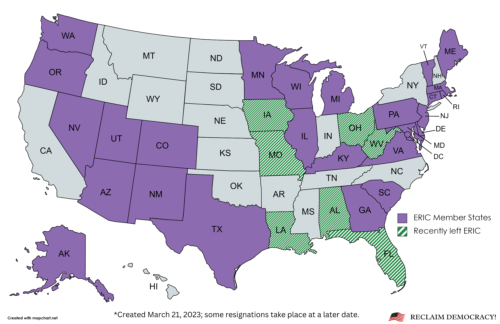By Jeff Milchen
May 4, 2022
First published in the Billings Gazette and Bozeman Chronicle.
Just weeks ago, Yellowstone County Judge Michael Moses blocked four recent Montana voting restriction laws from taking effect for this year’s elections. A full decision on the law’s constitutionality is yet to come, but Republican plans for a special legislative session (largely to promote false “election fraud” claims) collapsed after the preliminary ruling.
Yet Montana does have reason to improve one aspect of securing elections in which we lag behind most states: keeping voter rolls free of duplicate or ineligible registrations.
Unknown to most U.S. residents, a system to keep voter rolls current has operated effectively for a decade. Created in 2012 through collaboration among several states and the Pew Charitable Trusts, the Electronic Registration Information Center (ERIC) is a non-profit, non-partisan consortium managed and financed through voluntary membership by 31 (now 27) U.S. states and the District of Columbia.
Participating states regularly upload voter registration and motor vehicle license records through a secure, encrypted process. ERIC amasses the state data, then identifies and reports back any inaccuracies or duplicates, flags who moved, who died, and who is eligible to vote but isn’t registered. It’s a one-stop solution to guarantee highly accurate voter rolls.
ERIC can even identify illegitimate votes. Among the 14.6 million mail ballots cast during the 2016 and 2018 elections, ERIC flagged 372 likely cases of double voting or someone casting a deceased person’s ballot. That’s 0.0025 percent of votes cast.
Between 2012 and 2018, ERIC identified 10 million registered voters who moved–the most common cause of voter roll inaccuracies–or appeared on more than one voting list. ERIC is the only reliable tool to learn whether any person cast ballots for the same election in different states.
Yet for all the professed Republican concern about voter fraud, Montana is not among the majority of states (split between Republican and Democratic-leaning) participating in ERIC. Why have Montana Republicans not taken this simple step to actually increase election security? And why have you not heard reporters asking politicians that question?
It’s not about cost. Montana’s annual dues to ERIC would be about $25,000 next year–a fraction of the legal costs Republicans imposed on taxpayers by passing election laws certain to be challenged by Indigenous, youth, or disability rights groups whose constituents are targeted.

Editor’s note and update: while this op-ed was produced for Montana newspapers, the arguments apply for all states that are not yet part of ERIC. If your state is not among these members, we’d love to help you engage your state officials. Current ERIC members (as of March 17. 2023) are: AK, AZ, CO, CT, DE, FL, GA, IL, IA, KY, ME. MA, MD, MI, MN, MO, NV, NM, OR, PA, RI, SC, TX, UT, VT, VA, WA, WV, WI, and Washington, D.C.
With ERIC’s successful track record, no state had ever dropped out until Louisiana’s Secretary of State withdrew in January. Then 2022 Republican candidates for Secretary of State in Ohio and Alabama declared they’d withdraw from ERIC if they gained power. The excuse to sabotage genuine election integrity stems from fabricated and easily disproved allegations about ERIC published by the far-right Gateway Pundit blog.
So what motivates these baseless attacks? ERIC doesn’t just identify eligible unregistered voters–it obliges member states to contact those people and offer them the opportunity to register. It seems many GOP attacks on ERIC are motivated by the opinion that expanding democracy is an unacceptable requirement. Or perhaps eliminating the rare instances of illegal votes is not desirable to some vote suppressors, as that would weaken their justification for promoting more than 50 voter suppression tactics across U.S. states.
Steve Daines, Matt Rosendale, and other Montana GOP members all have been accomplices in undermining faith in our elections and our public servants. Daines’ treachery includes texting his supporters to falsely claim “Dems are stealing the election,” after Trump lost the 2020 election by over seven million votes. They all are culpable for helping incite the violent attack against our republic on January 6 of last year.
The GOP instilled doubt in election security among followers by spreading unrelenting lies, then used those doubts to justify laws erecting voting barriers for youth, Indigenous Montanans, and others they prefer not vote. Indigenous and youth advocates are among those who successfully sought to block the voter suppression tactics from taking effect.
In case repeated lies about the 2020 elections are more vivid than the truth, the U.S. Cybersecurity and Infrastructure Security Agencies (then-controlled by Trump appointee Chris Krebs) told us the 2020 election was the most secure in American history and, “There is no evidence that any voting system deleted or lost votes, changed votes, or was in any way compromised.”
Let’s call on Montana officials to stand up for voters reject the escalating assault on democracy. Joining ERIC is an administrative decision, so Montanans should ask Governor Gianforte and Secretary of State, Christi Jacobsen, to take this one simple action to advance their professed desire for more secure elections.
Failure to act would tell us all we need to know about their credibility.
Jeff Milchen (@JMilchen on Twitter) is a board member of the Montana-based Reclaim Democracy!
Along with our web page, you can share this 2-minute video that explains ERIC well. This FAQ (pdf) goes into more depth on ERIC’s operations
